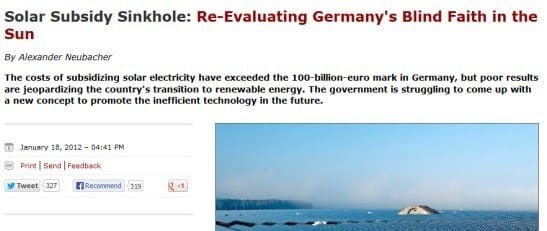Everywhere it has been tried, green energy is costly, unreliable & financially unsustainable over the long term. Here’s a reading list for those still in doubt.
I’ve recently been writing about the fossil fuel divestment movement which, according to some accounts, is “sweeping” US college campuses. In the opinion of the idealistic young activists involved in this movement, fossil fuels are passé.
“It’s time for a new age of renewables” they declare. College endowment funds should invest in “renewable energies” instead.
Why do we hold on so firmly to green fantasies? Why won’t we admit that currently available renewable energy sources don’t measure up?
This past March, the chief investment officer for California’s state pension plan called investments in clean technology “a noble way to lose money.” It’s possible, he acknowledged, that some of these investments might turn out to be profitable on a timescale of a decade or more. But his experience so far is that investing in clean tech is fraught with problems.
He isn’t alone in this view. Last fall, a Forbes journalist wrote about the “green tech meltdown” and quoted venture capitalist Vinod Khosla:
Environmentalists did a great job identifying the problems but they have done a real disservice to the community in proposing solutions, whether its algae or hydrogen cars – I could go through a laundry list. Most of the solutions proposed are so hypothetical that they don’t make economic sense.
Khosla still invests in clean tech, but says one of his rules is that, if a technology can’t survive without taxpayer subsidies five years after it launches, he won’t risk his own funds on it (here in Ontario, Canada, we’ve been committed by our government to paying hundreds of millions annually in subsidies to wind and solar companies for the next 20 years).
A January news article about Kleiner Perkins, “the most active venture capital firm in cleantech,” also observed that things look grim:
the firm has invested in 68 “greentech” companies, of which two have been sold.Three others have gone public.but they are trading far below their IPO prices.
The sudden shift in market conditions and investor sentiment hit some of the Kleiner-backed firms hard.
Amonix, a solar company, was forced to close a Nevada factory last year. Luca Technologies, which uses biotechnology to produce natural gas, canceled IPO plans at the eleventh hour last April due to difficult market conditions.
Silver Spring Networks, a smart-grid company, and biofuels maker Mascoma have yet to follow through on mid-2011 plans to go public. AltaRock Energy, a geothermal energy startup, was forced to abandon its first project in 2009 due to drilling problems.Fisker Automotive, an electric car maker, has been plagued by production delays and hasn’t built a car in more than six months. [article backed up here]
Walter Russell Mead, a US Democrat, nevertheless frequently berates environmentalists for their stubborn belief in unicorns “that only the greens can see” (see here, here, here, here, and here).
In the real world, green energy remains expensive and unreliable. Investor after investor, and nation after nation, have discovered this one more time (something similar happened after the 1970s oil crisis). Know anyone who’s still not convinced? Here’s a reading list:
AMERICA
- Green Investing: So Much Promise, So Little Return
- Once ‘Overhyped and Sexy,’ Solar Tumbles Back to Earth
- A look under the hood: why electric car startup Fisker crashed and burned
- Solar Industry Anxious Over Defective Panels
- Chrysler Loses $10,000 per Electric Fiat Sold
- Solar farm developer sued
- Big Wind Energy Subsidies: A Hurricane of Carnage, Cronyism and Corruption
CANADA
- The sorry lessons of green-power subsidies
- Grey skies for the green energy industry
- Ontario’s green disaster
EUROPE
- Era of Fast Growth Ends for Wind Energy in Europe
- Quagmire in the Sahara: Desertec’s Promise of Solar Power for Europe Fades
- Bulgaria to Suspend Up to 40% of Wind, Solar Power Capacity
- Poland Plans to Cut Subsidy for Renewables as Deficit Grows
GERMANY
- The Expensive Dream of Clean Energy: Will High Costs Kill Merkel’s Green Revolution?
- Solar Subsidy Sinkhole: Re-Evaluating Germany’s Blind Faith in the Sun
- The Price of Green Energy: Is Germany Killing the Environment to Save It?
- Germany’s Offshore Fiasco: North Sea Wind Offensive Plagued by Problems
- Germany Hits Brakes on Race to Renewable Energy Future
- Germans Cough Up for Solar Subsidies
- Twilight of an Industry: Bankruptcies Have German Solar on the Ropes
- Solar Subsidy ‘Insanity’ Will Cost Consumers
- German power market paralysed by subsidised renewables
SPAIN
- Sunny Spain suspends solar subsidy scam: €18bn flushed down the baño
- Solar Dreams, Spanish Realities
- Spain Halts Renewable Subsidies to Curb $31 Billion of Debt
- Spain’s Solar-Power Collapse Dims Subsidy Model
- Reform hits Spain’s green energy groups
UK
- Britain ‘faces energy crisis unless ministers abandon green policies’
- Householders waste £24 million subsidising redundant wind farms
- Scottish wind farms paid £1 million to shut down one day
- Wind farm turbines wear sooner than expected, says study
- Offshore wind farm is cut back by a third after public protests






